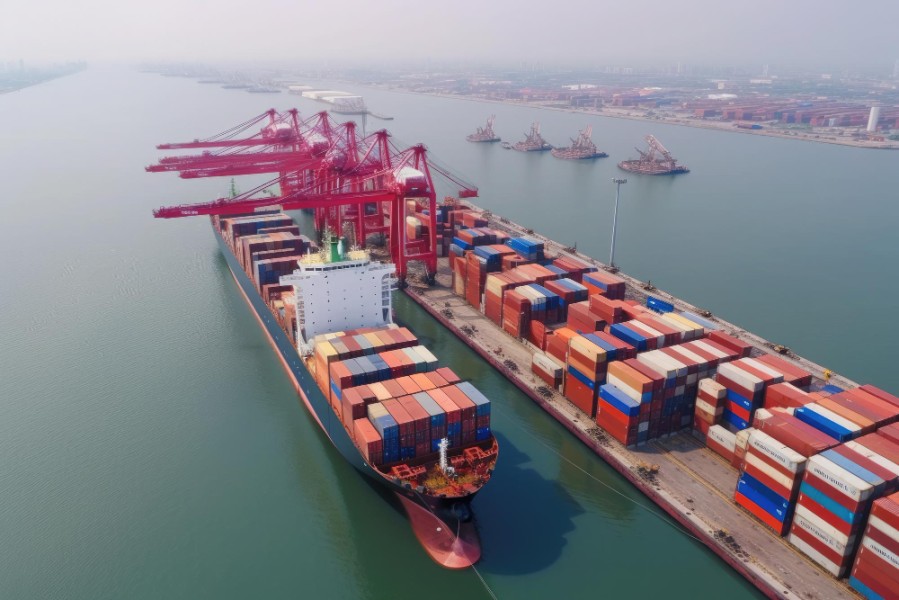
In today’s globalized world, ports play a pivotal role in facilitating the movement of goods and commodities. Efficient port operations are essential for reducing costs, ensuring timely deliveries, and maintaining the competitiveness of businesses. However, port operations often face congestion, delays, and disruptions that significantly impact profitability and customer satisfaction. The good news is that Artificial Intelligence (AI) is transforming the landscape of port traffic management, offering innovative solutions to these long-standing problems.
The Port Challenge: Delays and Disruptions
Port operations involve a complex dance of ships, trucks, cargo, and equipment requiring precise coordination. Delays in any part of this process can have a domino effect, causing bottlenecks, congestion, and increased costs. Traditional traffic management systems often need help to handle the sheer volume and complexity of operations, leading to inefficiencies and delays.
Enter AI-Powered Traffic Management
AI-powered traffic management systems are revolutionizing how ports operate. These systems leverage cutting-edge technologies like machine learning, predictive analytics, and real-time data processing to optimize the flow of vehicles and cargo within the port. Here’s a closer look at how AI is steering ports clear of delays:
1. Real-Time Data Integration:
AI systems ingest data from various sources, including sensors, cameras, weather forecasts, and ship tracking systems. This real-time data integration gives port operators a comprehensive view of all activities within the port.
2. Predictive Analytics:
AI algorithms analyze historical data and conditions to predict potential issues and delays. For example, by considering weather forecasts and past performance, the system can anticipate when a ship might experience delays due to adverse weather conditions.
3. Dynamic Routing:
AI optimizes the routing of ships and trucks within the port. It considers vessel size, cargo type, traffic conditions, and available equipment to ensure efficient movement. Dynamic routing minimizes congestion and waiting times.
4. Resource Allocation:
AI assists in allocating resources efficiently. Whether assigning labor for unloading cargo or managing equipment like cranes, AI ensures that resources are used optimally, reducing idle time and increasing productivity.
5. Maintenance Planning:
AI predicts equipment maintenance needs, allowing ports to schedule maintenance during downtime to minimize disruptions. This proactive approach prevents unexpected breakdowns that could lead to delays.
6. Communication and Visibility:
AI-powered dashboards and communication systems keep all stakeholders informed in real time. Port authorities, shipping companies, and truck drivers can access up-to-date information about cargo status, vessel arrivals, and expected completion times.
7. Environmental Impact Mitigation:
AI can factor in environmental considerations and optimize operations for reduced emissions and energy consumption, aligning with sustainability goals.
The Results: Efficiency and Customer Satisfaction
AI-driven port traffic management translates into tangible benefits. Ports that have adopted these strategies report reduced turnaround times, increased operational efficiency, and improved customer satisfaction. Businesses benefit from lower operating costs and the ability to meet delivery commitments consistently. Additionally, reduced congestion and environmental impact contribute to a more sustainable future for the industry.
Conclusion
As global trade continues to grow, efficient port operations become increasingly critical. AI-driven port traffic management strategies are not just a technological innovation but a necessity. By harnessing the power of AI, ports are steering clear of delays and disruptions, ensuring smooth operations and a competitive edge in the maritime industry.
One notable example of this innovation comes from aNumak & Company ®, a leader in AI-driven port optimization. aNumak & Company ® has recently designed groundbreaking consulting for predicting the expected completion time within port operations, helping businesses make more informed decisions and minimize costly delays. To learn more about these pioneering solutions and how they can transform your port operations, contact aNumak & Company ® at contact@anumak.com.
The future of ports is undoubtedly more innovative, more efficient, and ready to meet the challenges of tomorrow’s global economy. Embracing AI-driven traffic management is not just a strategic choice; it’s a key driver of success in the modern maritime industry.




